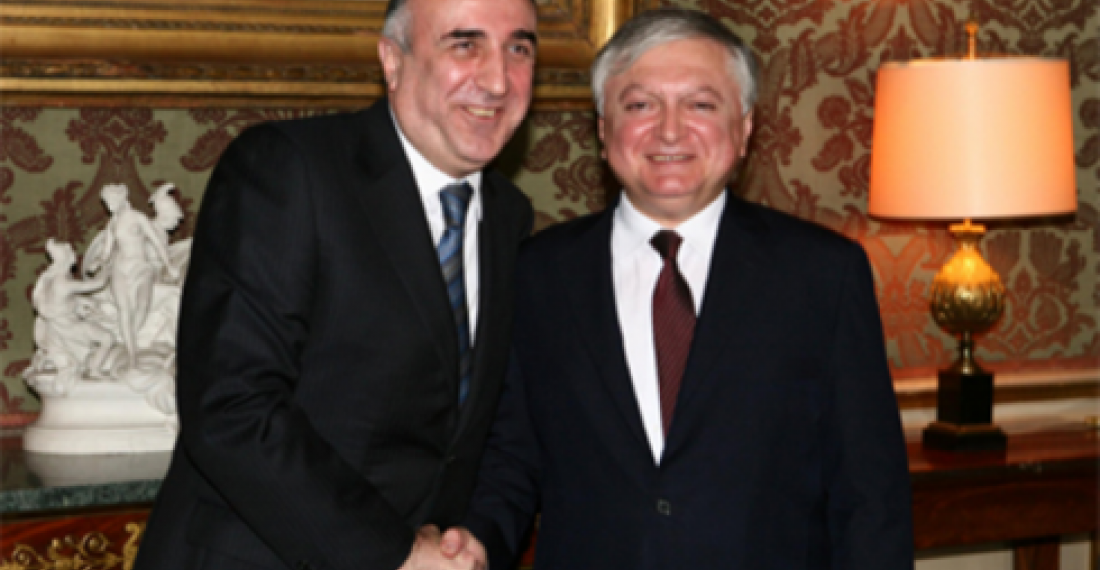The recent visit of the representatives of the three co-Chair countries of the OSCE Minsk Process to the South Caucasus has triggered another sharp exchange of words between Armenia and Azerbaijan on the state of relations between them, and the status of the negotiations on the Nagorno-Karabakh conflict.
The diplomats from the United States, France and Russia traveled to the region November 19 to 26 "to continue their efforts to assist the parties in finding a peaceful solution to the Nagorno-Karabakh conflict", according to an OSCE press release.
In Yerevan, they met on November 23 with President Sargsian and Foreign Minister Nalbandian, and in Baku, on November 26, they met with President Aliyev and Foreign Minister Mammadyarov. In Nagorno-Karabakh on November 21-22 they met with de facto authorities. In traveling to Nagorno-Karabakh on November 21, the Co-Chairs visited Zangilan and Jabrail regions to assess developments in those territories since their last visit in October 2010.
The OSCE statement says that the diplomats "reviewed with Presidents Sargsian and Aliyev the results of the separate meetings they held with Foreign Ministers Nalbandian and Mammadyarov in August and September, and discussed the ideas on the continuation of the peace process that they had presented to the Ministers in their joint meeting on October 27. The sides agreed to carry out further work on the level of the Foreign Ministers."
The visit triggered a series of sharp comments by senior officials in both Armenia and Azerbaijan as both sides blamed each other for lack of progress in the negotiations.
In Yerevan Armenian Foreign Minister Edward Nalbandian referred "to the provocative statements continually made by the Azerbaijani high-level leadership and mentioned that although those statements are for the internal use, they seriously harm the negotiations and escalate the situation in the region", according to a statement on the Ministry's website. Earlier, Nalbandian's deputy, Shavarsh Kocharian, in an interview with Reuteurs, accused Azerbaijan of racist ideology, .... unbridled distortion of history and ridiculous territorial claims towards the neighboring states".
By the time the OSCE Minsk Group diplomats arrived in Baku it was the turn of the Azerbaijanis to have a go. The Azerbaijani Foreign Minister, Elmar Mammadyarov, noted with regret that the recent visit to Yerevan did not give a reason to speak in positive tones, according to news.az. "Armenia should abandon the principle of no piece of land, not a step back", he said.
Mammadyarov said that the status quo should be changed, because the unresolved conflict "can lead to development of events in an undesirable way."
Weighing in later, the Head of the Foreign Relations Department of the Azerbaijani Presidential Administration Novruz Mammadov told journalists on Tuesday: "Our position is that the Armenian side should not seek delays of the negotiations by periodically finding excuses. Our requirements for the co-chairs and desire are not to delay the solution to this conflict. They have been conducting negotiations for many years in this regard, and these talks have not yielded any real results," Mammadov noted.
Trend News Agency reported that Mammadov told journalists in Baku that it is impossible for the conflict to remain unsolved. "Azerbaijani occupied territories must be liberated. If this happens, then the future fate of Armenia as a state, and the future of the Armenian people can get a guarantee to a definite sense. If the situation remains unchanged, the future of Armenian state and the Armenian people will be indefinite," he said.
Speaking about possible new initiatives from the OSCE Minsk Group, Mammadov referred to the "Madrid principles", stating that "Within these principles, it is necessary to achieve a constructive solution to the conflict, instead of looking for excuses. In this regard, Armenian leadership must demonstrate its will. One cannot hold the fate of this nation and this country as hostages. The Armenian leadership, by sacrificing fate of the Armenian people and the state, finds certain excuses and prolongs the negotiation process in an effort to stay in power longer. It is their tragedy."
Commonspace.eu political editor said in a comment: "It is clear that the differences between the sides are not narrowing. The OSCE Minsk Group co-Chair countries had hoped that their visit to the region could pave the way for a meeting between the Armenian and Azerbaijani foreign ministers and their own foreign ministers in Dublin next week, in the framework of the OSCE annual Ministerial Meeting. This now looks unlikely. There is a poisoned atmosphere at the moment around the negotiations and unless this is defused it is difficult to imagine meaningful peace negotiations restarting."
source: commonspace.eu with various media outlets
photo: The Foreign Ministers of Azerbaijan and Armenia in Paris on 18 June 2012. (picture courtesy of the French Foreign Ministry).







